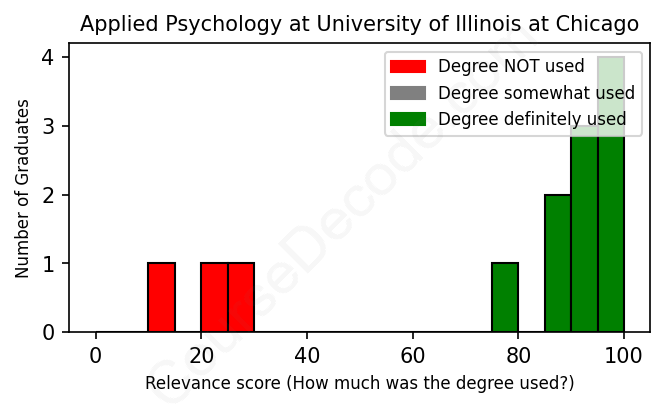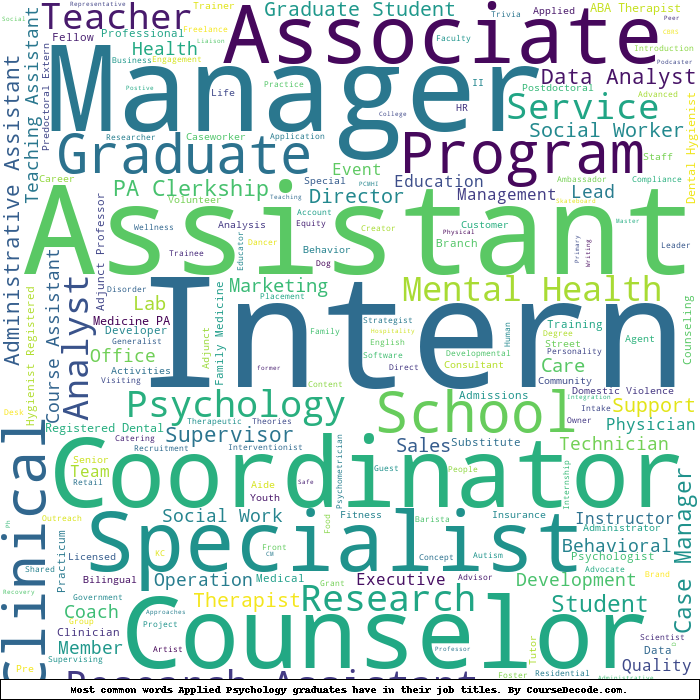
First, some facts. Of the Applied Psychology graduates from University of Illinois at Chicago we've analyzed , here's how many have used (or NOT used) their degree in their career:

These are estimates based on AI analysis of 13 LinkedIn profiles (see below).
The verdict? Above average. Overall, with an average relevance score of 75%, Applied Psychology graduates from University of Illinois at Chicago have a higher likelihood (+8%) of finding work in this field compared to the average graduate across all fields:
And for comparison, here's the chart for all profiles we've looked at across all degrees.
Also, after graduating, 46% of these graduates have pursued further education other than another Bachelor's degree (such as a Masters degree or other), compared to the average across all profiles of 35%. This suggests you may need more than just a Bachelors degree to be competitive as a Applied Psychology graduate.
See the details:
|
Relevance score: 91% We think this person has gone into a career highly relevant to their degree. We think this person has gone into a career highly relevant to their degree.
DEGREE INFOGraduated in 2015 from University of Illinois at Chicago with a Bachelor of Applied Science (B.A.Sc.) in Applied Psychology. Also pursued further education since (see below). JOB HISTORY SINCE GRADUATIONResearch Assistant Rush University Medical Center Jun 2015 - Jul 2017 Master Degree in Clinical Psychology  Montclair State University - Counseling and Psychological Services (CAPS) Sep 2017 - May 2019 Predoctoral Extern  Montclair State University - Counseling and Psychological Services (CAPS) Aug 2018 - May 2019 Psychology Intern  Hoboken University Medical Center Partial Hospital Program Jul 2019 - Jun 2020 Predoctoral Extern  New York State Office of Mental Health Emotional Support COVID-19 Helpline Apr 2020 - Aug 2020 Predoctoral Extern  Newark Beth Israel Medical Center Metropolitan Regional Diagnostic and Treatment Center (Metro RDTC) Jul 2020 - May 2021 Adjunct Professor  Montclair State University Aug 2019 - Aug 2021 Ph.D. in Clinical Psychology  Montclair State University Aug 2017 - Aug 2022 Clinical Psychology Intern  Captain James A. Lovell Federal Health Care Center (FHCC) Aug 2021 - Aug 2022 Postdoctoral Fellow  Rush University Medical Center Aug 2022 - Sep 2023 Case Manager  O'Connor Professional Group Apr 2021 - Present Primary Care Mental Health Integration (PCMHI) Psychologist  U.S. Department of Veterans Affairs Sep 2023 - Present FURTHER DEGREES DONE SINCE GRADUATINGDoctor of Philosophy - PhDMontclair State University 2017 - 2022 Master of Arts - MA Montclair State University 2017 - 2019 ABOUTMy research focuses on understanding the socio-ecological factors that facilitate resilience in individuals and communities that have experienced trauma and more specifically, on identifying the psychosocial mechanisms underlying sexual assault survivors disclosure, reporting, and treatment-seeking behaviors. Clinically, I have experience in implementing a variety of individual and group psychotherapies, including cognitive-behavioral therapy (CBT), dialectical behavioral therapy (DBT), motivational interviewing (MI), and trauma-focused CBT to diverse individuals across the lifespan that present with a range of mental health diagnoses, including anxiety and mood disorders, trauma- and stressor-related disorders, substance use disorders, personality disorders, ADHD, and severe mental illness. |
The top 10 most common jobs done by the graduates we've analyzed (ranked most common to least) are:
After checking out the job roles of graduates from the University of Illinois at Chicago who studied Applied Psychology, it’s pretty clear that there’s a mix of positions in terms of relevance to their degree. A good number landed jobs in Human Resources, especially as training coordinators and administrators, which makes sense given how understanding human behavior and motivation are key parts of applied psychology. Other common roles included counseling and social work, where they could directly apply their psychological skills in therapeutic settings. Many of these positions, like Mental Health Counselor and Bilingual Mental Health Therapist, demonstrated a solid connection to their studies since they deal directly with mental health issues and patient care.
That said, not every job had a strong link to applied psychology. Some graduates found themselves in roles like administrative positions, marketing, or even teaching, where the connection to their degree wasn’t that strong. For instance, being a School Business Manager or an Office Administrator involves more administrative tasks than applying psychological principles. Overall, while a significant chunk of these jobs were relevant to Applied Psychology, there’s still a fair amount where the connection isn't as direct. It’s a mixed bag, but those who pursued careers in mental health or human resources really maximized their education in applied psychology.
Here is a visual representation of the most common words in job titles for Applied Psychology graduates (this is across all Applied Psychology graduates we've analyzed, not just those who went to University of Illinois at Chicago):

Based on the career trajectories of graduates from the University of Illinois at Chicago who studied Applied Psychology, it looks like many of them have generally landed in roles that are quite relevant to their field. Right after graduation, a lot of them tend to start in entry-level positions such as community educators, case managers, or in various roles within human resources. These positions often involve direct client interaction or supporting individuals in various capacities, which aligns well with the skills they developed during their degree. For instance, several grads moved into roles within mental health services, education, and community engagement quickly after finishing their studies, showcasing a solid entry point into psychology-related careers.
As they gain experience, about five to ten years down the line, many of these graduates often advance into higher-level positions. Roles like director of people development, case managers, and specialized therapists become more common, indicating a tendency to climb the ladder within relevant fields. It’s worth noting, however, that a few graduates took some detours into more unrelated fields like sales and marketing early in their careers, which might suggest that not every graduate directly follows a psychology-specific trajectory. Overall, though, it seems like those who are committed to the field of applied psychology find fulfilling careers, making good use of their education and skills in various impactful ways.
The Bachelor’s degree in Applied Psychology at the University of Illinois at Chicago can be a mix of challenging and manageable, depending on your interests and strengths. Generally, it’s not the most brutal degree out there, but it does require a good amount of critical thinking, research skills, and a willingness to dive into human behavior and mental processes. You’ll find a blend of psychology theories, statistics, and real-world applications, which can be pretty interesting if you like understanding how people think and behave. So, if you're naturally curious and engaged with the material, you might find it easier to handle than some other majors, but it’s definitely not a walk in the park either!
Most commonly, in the LinkedIn profiles we've looked at, it takes people 4 years to finish a Bachelor degree in Applied Psychology.
Looking at the career paths of these Applied Psychology graduates from the University of Illinois at Chicago, it seems like they're mostly doing okay, but not everyone appears to be raking in the big bucks just yet. Many have moved into roles in human resources, healthcare, and education, which can pay decently, especially as they climb the career ladder. For instance, the one who became a Director of People Development likely has a pretty solid salary now. However, some others are still in early career stages or roles like counseling and teaching, which typically don't pay as much initially. So, while they seem to be finding steady jobs and growing in their fields, it might not be the kind of money you'd think of as "big," especially considering student debt and living expenses. Overall, they're building careers, but it looks like a mix between comfortable and just getting by for now.
Here is a visual representation of the most common words seen in the "about" section of LinkedIn profiles who have a Bachelor degree in Applied Psychology (this is across all Applied Psychology graduates we've analyzed, not just those who went to University of Illinois at Chicago). This may or may not be useful:

Here are all colleges offering a Bachelor degree in Applied Psychology (ordered by the average relevance score of their Applied Psychology graduates, best to worst) where we have analyzed at least 10 of their graduates:
| College | Score | Count |
|---|---|---|
 New York University New York University
|
82 | 15 |
 University of Illinois at Chicago University of Illinois at Chicago
|
75 | 13 |